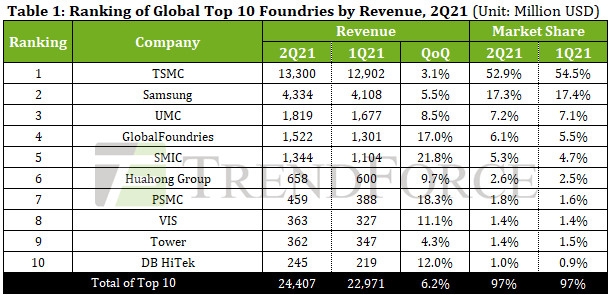Chip Shortage is the Best That Could Happen to Samsung and Other Component Manufacturers
Samsung, TSMC, and other chipmakers have once again revealed big revenue numbers despite a shortage of chip availability in the market. How is this possible?
1

Chips are in short supply in almost every industry and country in the world. Although for many investors and entrepreneurs this is a real nightmare, there is one industry that has no reason to complain. Silicon chip manufacturers such as TSMC and Samsung are rubbing their hands in glee. For them, times have never been better.
The analytical agency TrendForce presented data on the market situation of chip manufacturing giants in the second quarter of 2021. The top 10 companies collectively generated revenues of $24.4 billion, which translates to a 6% increase from the previous quarter. It's also a record eighth consecutive quarter of growth (counting from Q3 2019).

According to TrendForce's analysis, the reason for this is a combination of several circumstances: post-pandemic demand, the impact of 5G technology on the industry, geopolitical tensions, and chip shortages. Interestingly, even such factors as power shortages (TSMC's factories in Taiwan) or the effects of snowstorms (Samsung's factory in Texas was out of production for a month and a half) did not significantly affect the companies' revenues.
Currently (Q3 2021), the situation in the market has not changed substantially. There is still limited supply, newly opened production lines are fully contracted and still do not cover market demand. Manufacturers have to decide which types of ICs will receive priority. In Q2 2021, for example, these are silicon wafers for the automotive market - the result of political decisions in many countries. However, even such decisive actions cannot solve supply problems for a specific industry. According to Reuters, GM is cutting production in eight U.S. factories and Toyota is reducing global production by 40%.
However, TrendForce predicts that chipmakers will maintain their revenue growth in the next quarter.
- Bold attempt to save the game failed. Remedy announced a „profit warning,” essentially admitting defeat
- Players choose remakes over remasters, spending more to relive the classics, although there are few exceptions
- 72% of game developers think Steam is a monopoly. However, they have one good reason to keep using it
1
Latest News
- End of remote work and 60 hours a week. Demo of Naughty Dog's new game was born amid a crunch atmosphere
- She's the new Lara Croft, but she still lives in fear. Trauma after Perfect Dark changed the actress' approach to the industry
- „A lot has become lost in translation.” Swen Vincke suggests that the scandal surrounding Divinity is a big misunderstanding
- Stuck in development limbo for years, ARK 2 is now planned for 2028
- Few people know about it, but it's an RPG mixing Dark Souls and NieR that has received excellent reviews on Steam, and its first DLC will be released soon

